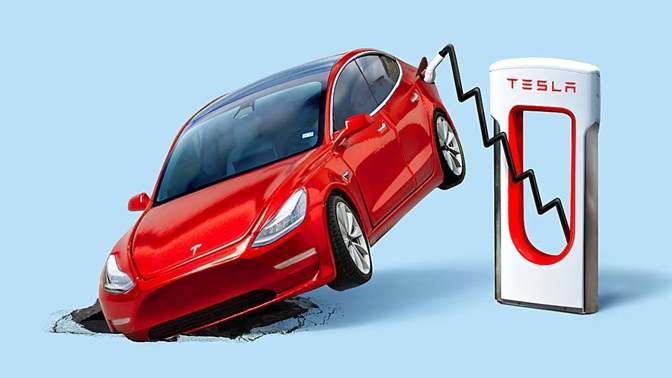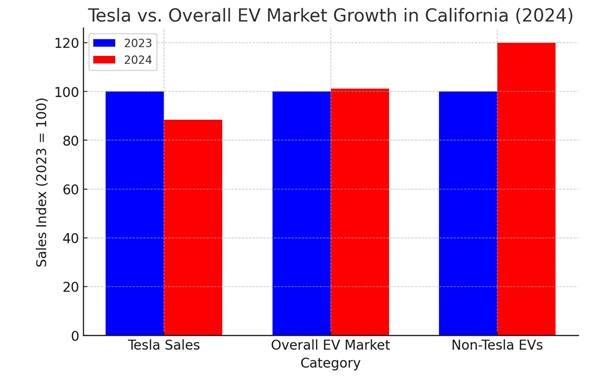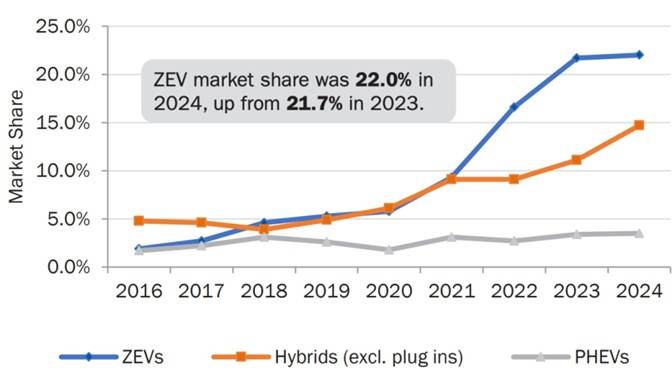For years, Tesla has dominated California’s EV market, riding the wave of increasing electric vehicle adoption. However, for the first time, the company has seen a double-digit decline in sales in the state, even as the overall EV market continues to grow. This surprising shift raises a crucial question: Is Tesla losing its edge in the most important EV market in the U.S.?

Tesla’s First Annual Sales Decline in California
California isn’t just another state when it comes to EV adoption—it’s the heart of the U.S. electric vehicle market. The state has been a major driver of EV sales, making up a significant portion of the country’s total electric vehicle registrations. Despite facing increased competition over the years, Tesla always managed to grow its sales in California—until now.
According to the California New Car Dealers Association (CNCDA), Tesla’s deliveries dropped by 11.6% in 2024, translating to 27,000 fewer vehicles sold compared to the previous year.
Tesla’s Market Share Takes a Hit
Even with this decline, Tesla remains the leading EV brand in California. However, its market share is shrinking:
- 2023: Tesla held a 60% share of the California EV market.
- 2024: That number dropped to 52.5%.
While Tesla still commands more than half of the state’s EV market, this 7.6% drop in market share is significant—especially considering that EV adoption continues to rise in California.
The Rest of the EV Market Is Growing
Here’s where things get interesting:
- The overall EV market in California grew by 1.2% in 2024 despite Tesla’s drop in sales.
- Excluding Tesla, the rest of the EV market grew by 20%!
This means that other automakers are rapidly gaining ground, eating into Tesla’s dominance. Brands like Hyundai, Ford, Rivian, and BMW have been increasing their EV offerings, giving buyers more choices than ever before.

Why Is Tesla Losing Ground?
Several factors could be contributing to Tesla’s declining sales in California:
1️⃣Increased Competition
Years ago, Tesla had little to no competition in the EV space. Today, nearly every major automaker offers electric vehicles, with some even undercutting Tesla’s pricing or providing superior features.
Brands like:
- Hyundai (Ioniq 5, Ioniq 6)
- Ford (Mustang Mach-E, F-150 Lightning)
- Rivian (R1T, R1S)
- BMW (i4, iX)
…are all gaining market share by offering attractive alternatives to Tesla’s lineup.
2️⃣ Price Cuts and Resale Value Concerns
Tesla has repeatedly slashed prices on its vehicles over the past year. While this may boost short-term sales, it also affects the resale value of Teslas—making some buyers hesitant to commit. Owners who bought Teslas before the price cuts have seen their car values drop significantly, leading to frustration among existing customers.
3️⃣ Elon Musk’s Controversies
Tesla’s CEO, Elon Musk, has always been a polarizing figure. However, his recent actions and statements—including his growing association with political controversies—may be turning off potential buyers, especially in a progressive state like California. According to some analysts, Musk’s reputation decline has directly impacted Tesla’s brand perception, leading some consumers to explore other EV options.
4️⃣ Tax Credit and Incentives Uncertainty
Federal EV incentives have played a huge role in Tesla’s past success. However, with potential changes to the federal tax credit system, California has stepped in to offset the difference to keep EV adoption moving forward. Still, uncertainty about incentives can cause buyers to hold off on purchasing, waiting to see if they’ll get better deals later.

California’s EV Market Keeps Growing
Even with Tesla’s struggles, California remains the strongest EV market in the U.S..
- EV market share in California is now 22%—meaning that more than 1 in 5 new cars sold in the state is electric.
- Other EV brands are seeing strong growth, proving that demand for electric cars isn’t slowing down—just shifting to more diverse options.
Tesla’s dominance isn’t completely gone, but the days of unchecked market control may be coming to an end.
Looking ahead, Tesla could face an even steeper decline in sales—especially in California—unless it makes some major changes.

Some key questions for 2025:
❓ Will Tesla’s price cuts continue?
❓ Can Tesla refresh its lineup to stay competitive?
❓ How much will Elon Musk’s personal reputation impact Tesla’s brand?
❓ Will more consumers shift to other brands as the EV market expands?
Is Tesla losing its grip on California’s EV market for good? Or will the company bounce back in 2025?
Related Post
